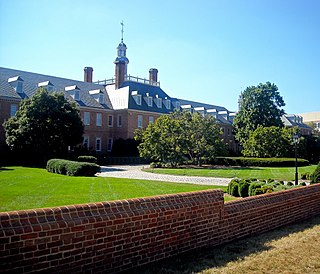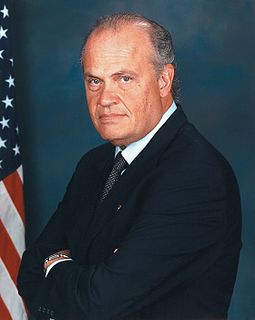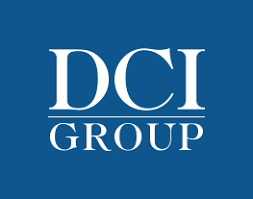Related Research Articles

The Federal Reserve System is the central banking system of the United States of America. It was created on December 23, 1913, with the enactment of the Federal Reserve Act, after a series of financial panics led to the desire for central control of the monetary system in order to alleviate financial crises. Over the years, events such as the Great Depression in the 1930s and the Great Recession during the 2000s have led to the expansion of the roles and responsibilities of the Federal Reserve System.

In politics, lobbying, persuasion, or interest representation is the act of lawfully attempting to influence the actions, policies, or decisions of government officials, most often legislators or members of regulatory agencies. Lobbying, which usually involves direct, face-to-face contact, is done by many types of people, associations and organized groups, including individuals in the private sector, corporations, fellow legislators or government officials, or advocacy groups. Lobbyists may be among a legislator's constituencies, meaning a voter or bloc of voters within their electoral district; they may engage in lobbying as a business. Professional lobbyists are people whose business is trying to influence legislation, regulation, or other government decisions, actions, or policies on behalf of a group or individual who hires them. Individuals and nonprofit organizations can also lobby as an act of volunteering or as a small part of their normal job. Governments often define and regulate organized group lobbying that has become influential.

The Federal National Mortgage Association (FNMA), commonly known as Fannie Mae, is a United States government-sponsored enterprise (GSE) and, since 1968, a publicly traded company. Founded in 1938 during the Great Depression as part of the New Deal, the corporation's purpose is to expand the secondary mortgage market by securitizing mortgage loans in the form of mortgage-backed securities (MBS), allowing lenders to reinvest their assets into more lending and in effect increasing the number of lenders in the mortgage market by reducing the reliance on locally based savings and loan associations. Its sister organization is the Federal Home Loan Mortgage Corporation (FHLMC), better known as Freddie Mac. As of 2018, Fannie Mae is ranked number 21 on the Fortune 500 rankings of the largest United States corporations by total revenue.

Freddie Dalton Thompson was an American politician, attorney, lobbyist, columnist, actor and radio personality. Thompson, a Republican, served in the United States Senate representing Tennessee from 1994 to 2003, and was a Republican presidential candidate in 2008.
The savings and loan crisis of the 1980s and 1990s was the failure of 1,043 out of the 3,234 savings and loan associations (S&Ls) in the United States from 1986 to 1995. An S&L or "thrift" is a financial institution that accepts savings deposits and makes mortgage, car and other personal loans to individual members.
Bank of America Home Loans is the mortgage unit of Bank of America. In 2008, Bank of America purchased the failing Countrywide Financial for $4.1 billion. In 2006, Countrywide financed 20% of all mortgages in the United States, at a value of about 3.5% of United States GDP, a proportion greater than any other single mortgage lender.
A mortgage broker acts as an intermediary who brokers mortgage loans on behalf of individuals or businesses.
A loan guarantee, in finance, is a promise by one party to assume the debt obligation of a borrower if that borrower defaults. A guarantee can be limited or unlimited, making the guarantor liable for only a portion or all of the debt.
Quicken Loans LLC. is a mortgage lending company headquartered in the One Campus Martius building in the heart of the financial district of downtown Detroit, Michigan. In January 2018, the company became the largest overall retail lender in the U.S.. Unlike other large mortgage lenders that depend on deposits, Quicken Loans relies on wholesale funding to make its loans and uses online applications rather than a branch system. Amrock and One Reverse Mortgage are also part of the Quicken Loans Family of Companies. The company closed more than $400 billion of mortgage volume across all 50 states from 2013 through 2017.
The subprime mortgage crisis impact timeline lists dates relevant to the creation of a United States housing bubble and the 2005 housing bubble burst and the subprime mortgage crisis which developed during 2007 and 2008. It includes United States enactment of government laws and regulations, as well as public and private actions which affected the housing industry and related banking and investment activity. It also notes details of important incidents in the United States, such as bankruptcies and takeovers, and information and statistics about relevant trends. For more information on reverberations of this crisis throughout the global financial system see Financial crisis of 2007–2008.
The Hope Now Alliance is a cooperative effort between the US government, counselors, investors, and lenders to help homeowners who may not be able to pay their mortgages. Created in 2007 in response to the subprime mortgage crisis, the alliance claims to have helped over 1 million homeowners avoid foreclosure through January 2008. Critics of the alliance contend that the assistance provided does not go far enough, and that not enough homeowners are being helped.
The Mortgage Bankers Association (MBA) is the United States national association representing all facets of the real estate finance industry. Headquartered in Washington, D.C., MBA represents over 2,200 member companies. MBA’s membership base includes all sectors of the real estate finance industry including originators, servicers, underwriters, compliance personnel and information technology professionals representing mortgage companies in the residential, commercial and multi-family arenas.
Collateral Protection Insurance, or CPI, insures property held as collateral for loans made by lending institutions. CPI, also known as force-placed insurance and lender placed insurance, may be classified as single-interest insurance if it protects the interest of the lender, a single party, or as dual-interest insurance coverage if it protects the interest of both the lender and the borrower.
The Farm Credit Council is the national trade association of the Farm Credit System, a U.S. network of borrower-owned cooperative lending institutions and service organizations. The Farm Credit Council represents the Farm Credit System in legislative and regulatory lobbying before the United States Congress government and state legislatures.
The U.S. central banking system, the Federal Reserve, in partnership with central banks around the world, took several steps to address the subprime mortgage crisis. Federal Reserve Chairman Ben Bernanke stated in early 2008: "Broadly, the Federal Reserve’s response has followed two tracks: efforts to support market liquidity and functioning and the pursuit of our macroeconomic objectives through monetary policy." A 2011 study by the Government Accountability Office found that "on numerous occasions in 2008 and 2009, the Federal Reserve Board invoked emergency authority under the Federal Reserve Act of 1913 to authorize new broad-based programs and financial assistance to individual institutions to stabilize financial markets. Loans outstanding for the emergency programs peaked at more than $1 trillion in late 2008."
The Troubled Asset Relief Program (TARP) is a program of the United States government to purchase toxic assets and equity from financial institutions to strengthen its financial sector that was passed by Congress and signed into law by President George W. Bush on October 3, 2008. It was a component of the government's measures in 2008 to address the subprime mortgage crisis.
Loan modification is the systematic alteration of mortgage loan agreements that help those having problems making the payments by reducing interest rates, monthly payments or principal balances. Lending institutions could make one or more of these changes to relieve financial pressure on borrowers to prevent the condition of foreclosure. Loan modifications have been practiced in the United States since The 2008 Crash Of The Housing Market from Washington Mutual, Chase Home Finance, Chase, JP Morgan & Chase, other contributors like MER's. Crimes of Mortgage ad Real Estate Staff had long assisted nd finally the squeaky will could not continue as their deviant practices broke the state and crashed. Modification owners either ordered by The United States Department of Housing, The United States IRS or President Obamas letters from Note Holders came to those various departments asking for the Democratic process to help them keep their homes and protection them from explosion. Thus the birth of Modifications. It is yet to date for clarity how theses enforcements came into existence and except b whom, but t is certain that note holders form the Midwest reached out in the Democratic Process for assistance. FBI Mortgage Fraud Department came into existence. Modifications HMAP HARP were also birthed to help note holders get Justice through reduced mortgage by making terms legal. Modification of mortgage terms was introduced by IRS staff addressing the crisis called the HAMP TEAMS that went across the United States desiring the new products to assist homeowners that were victims of predatory lending practices, unethical staff, brokers, attorneys and lenders that contributed to the crash. Modification were a fix to the crash as litigation has ensued as the lenders reorganized and renamed the lending institutions and government agencies are to closely monitor them. Prior to modifications loan holders that experiences crisis would use Loan assumptions and Loan transfers to keep the note in the 1930s. During the Great Depression, loan transfers, loan assumption, and loan bail out programs took place at the state level in an effort to reduce levels of loan foreclosures while the Federal Bureau of Investigation, Federal Trade Commission, Comptroller, the United States Government and State Government responded to lending institution violations of law in these arenas by setting public court records that are legal precedence of such illegal actions. The legal precedents and reporting agencies were created to address the violations of laws to consumers while the Modifications were created to assist the consumers that are victims of predatory lending practices. During the so-called "Great Recession" of the early 21st century, loan modification became a matter of national policy, with various actions taken to alter mortgage loan terms to prevent further economic destabilization. Due to absorbent personal profits nothing has been done to educate Homeowners or Creditors that this money from equity, escrow is truly theirs the Loan Note Holder and it is their monetary rights as the real prize and reason for the Housing Crash was the profit n obtaining the mortgage holders Escrow. The Escrow and Equity that is accursed form the Note Holders payments various staff through the United States claimed as recorded and cashed by all staff in real-estate from local residential Tax Assessing Staff, Real Estate Staff, Ordinance Staff, Police Staff, Brokers, attorneys, lending institutional staff but typically Attorneys who are also typically the owners or Rental properties that are trained through Bankruptcies'. that collect the Escrow that is rightfully the Homeowners but because most Homeowners are unaware of what money is due them and how they can loose their escrow. Most Creditors are unaware that as the note holder that the Note Holder are due an annual or semi annual equity check and again bank or other lending and or legal intuitions staff claim this monies instead. This money Note Holders were unaware of is the prize of real estate and the cause of the Real Estate Crash of 2008 where Lending Institutions provided mortgages to people years prior they know they would eventually loose with Loan holders purchasing Balloon Mortgages lending product that is designed to make fast money off the note holder whom is always typically unaware of their escrow, equity and that are further victimized by conferences and books on HOW TO MAKE MONEY IN REAL STATE - when in fact the money is the Note Holder. The key of the crash was not the House, but the loan product used and the interest and money that was accrued form the note holders that staff too immorally. The immoral and illegal actions of predatory lending station and their staff began with the inception of balloon mortgages although illegal activity has always existed in the arena, yet the crash created "Watch Dog" like HAMP TEAM, IRS, COMPTROLLER< Federal Trade Commission Consumer Protection Bureau, FBI, CIA, Local Police Department, ICE and other watch dog agencies came into existence to examine if houses were purchased through a processed check at Government Debited office as many obtained free homes illegally. Many were incarcerated for such illegal actions. Modifications fixed the Notes to proper lower interest, escrow, tax fees that staff typically raised for no reason. Many people from various arenas involved in reals estate have been incarcerated for these actions as well as other illegal actions like charging for a modification. Additionally Modifications were also made to address the falsifications such as inappropriate mortgage charges, filing of fraudulently deeds, reporting of and at times filing of fraudulent mortgages that were already paid off that were fraudulently continued by lenders staff and attorneys or brokers or anyone in the Real Estate Chain through the issues of real estate terms to continue to violate United States Laws, contract law and legal precedence where collusion was often done again to defraud and steal from the Note Holder was such a common practice that was evidence as to why the Mortgage Crash in 2008 occurred for the purpose of winning the prize of stealing from Homeowners and those that foreclosed was actually often purposefully for these monies note holders were unaware of to be obtained which was why Balloon mortgages and loans were given to the staff in the Real Estate Market with the hope and the expectation that the loan holders would default as it offered opportunity to commit illegal transactions of obtaining the homeowners funds. While such scams were addressed through modifications in 2008. The Market relied heavily on Consumers ignorance to prosper, ignorance of real estate terms, ignorance on what they were to be charged properly for unethical financial gain and while staff in real estates lending arenas mingled terms to deceive y deliberate confusion consumers out of cash and homes while the USA Government provided Justice through President Obama's Inception and IRS Inception of Modifications which addressed these unethical profits in Reals Estate. It was in 2009 that HARP, HAMP and Modifications were introduced to stop the victimization of Note Holders. Taking on the Banks that ran USA Government was a great and dangerous undertaking that made America Great Again as Justice for Consumers reigned. Legal action taken against institutions that have such business practices can be viewed in State Code of Law and Federal Law on precedent cases that are available to the public. Finally, It had been unlawful to be charged by an attorney to modify as well as for banking staff to modify terms to increase a mortgage and or change lending product to a balloon in an concerted effort to make homeowner foreclose which is also illegal, computer fraud and not the governments intended purpose or definition of a modification. There are reputable companies that are trained to assist with foreclosure defense and home retention options. In addition, hud.gov offers a variety of non-profit agencies that offer assistance.

The Dodd–Frank Wall Street Reform and Consumer Protection Act is a United States federal law that was enacted on July 21, 2010. The law overhauled financial regulation in the aftermath of the Great Recession, and it made changes affecting all federal financial regulatory agencies and almost every part of the nation's financial services industry.

Joseph M. Otting is an American businessman and government official. He served as the 31st Comptroller of the Currency from November 27, 2017 to May 29, 2020.

DCI Group is an American public relations, lobbying and business consulting firm based in Washington, D.C. The company was founded in 1996 as a consulting firm, and has since expanded its practice to become a public affairs company offering a range of services. DCI Group provides communications and advocacy services to clients including large US corporations, trade associations, non-profit organizations, educational institutions, and government organizations. Services include communication campaigns to solicit public action on legislative issues, including, it has been alleged, the creation of grass-roots fronts for corporate campaigns, and campaigns for clients on social media websites. DCI has been described as having "a knack for creating grassroots organizations and recruiting third party allies to advocate for a cause or an issue".
References
- ↑ ""First American Introduces Reverse Mortgage Score," DS News, November 17, 2008". Archived from the original on 2012-07-29.
- ↑ "National Reverse Mortgage Lenders Association Political Action Committee (Nrmla Pac) 2008 - Money, Politics, Committees, Elections in 2008". www.campaignmoney.com.
- ↑ "providencejournal.com: Local & World News, Sports & Entertainment in Providence, RI". providencejournal.com.
- ↑ ""Privacy concerns attributed to no-shows at housing foreclosure event," Frederick News-Post, November 8, 2008".
- ↑ McDowell, Edwin (January 20, 2002). "Loans That Turn a Home Into a Cash Flow". The New York Times.